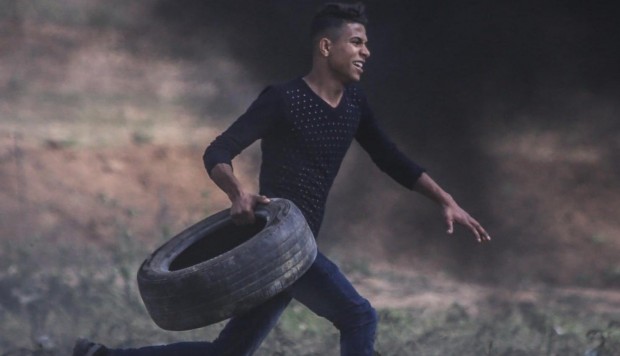“You! the one with the red T-shirt that has just insulted me, as a the son of a bitch. I promise to respond to you. We are ready for everything.” An Israeli soldier says by loudspeaker to the young men demonstrating in the weekly march on the Gaza border.
But the soldier’s threat did not compel hundreds of young men who’d gathered close to the fence between Gaza and Israel to step back, despite the intensity of tear gas canisters fired by soldiers towards the masked protesters, as well as the heat of the day, reaching 35 degrees Celsius (104 F) east of the town of Khuza’a in Khan Younis in the southern Gaza Strip.
“Give the one-finger salute, guys! ” One of the protesters cheered. And the protesters did so, responding to the threats of the soldier, who characterized them by shirt color, saying: “You the yellow T-shirt guy! I heard you and saw you when you insulted me, I have no problem shooting you as I did during the past Fridays.”
Palestinians in Gaza held their sixth Friday rally as part of the Great March of Return. The protests commemorate the “Nakba,” or Catastrophe, the displacement of Palestinians from lands that would become Israel in 1948. On Friday demonstrators highlighted the plight of Palestinian workers and the unemployed in a demonstration labeled “Friday of Workers.”
Beginning in the morning, protesters brought tires to within 500 yards of the border, preparing to set fire to them and roll them toward the fence, and use them as a smokescreen to counter Israeli snipers behind the sandy hills.
The slingshot is the only ‘weapon’ of some demonstrators. Their small stones rarely reach beyond the fence, though slingshots managed to knock down two Israeli drones, causing them to crash in the sky of Khuza’a.
At least 70 Palestinians were injured by Israeli live fire Friday, the lowest casualty toll since the protests began. Medics also treated 1,073 people, for tear gas inhalation, the Gaza health ministry said.
The protests were backed by “logistical support” from women who had prepared large bags of croissants filled with thyme, cheese and spinach, to be distributed free to demonstrators. “I woke up early in the morning to prepare 300 croissants,” Fatima Dalloul, 44, told Mondoweiss.
Fatima, a mother of 8 children, prepared her fast food packages with her neighbors in the Abasan neighborhood. “The majority of these young people are poor and need to feel that their mothers support their weekly mobilizing. While it is true that we are concerned that youths might be killed, we must support them and their right to return to stolen lands.”
Since the first protest March 30, 44 Palestinians have been killed and more than 1,700 injured by Israeli fire. Friday marked the first weekly protest in which no Palestinian were reported killed by sunset.
One protester, Abdullah Al-Mughrabi, 39, came with his family and held a poster asserting the right of return. “I have nothing to lose,” he said. “The whole world must know our right to return.” Abdullah’s origins are the city of Jaffa, which his grandfather was forced to abandon in 1948.
“Seventy years of disaster is enough for us,” Abdullah added. “The siege treats us like animals in a stockyard without rights. Even a poor Somali can get medical treatment, travel and free trade. But we are not pirates, we are a people deprived of our rights, with the consent of the United Nations.”
Crowds were smaller today’s afternoon than in previous weeks, with Gazans saying they predict a large rally on May 14th, when the U.S will move its embassy from Tel Aviv to Jerusalem.
The U.S. move angered Palestinian leaders, who have refused to talk to the Trump administration, accusing it of pro-Israel bias. Israel’s government celebrated the U.S. decision, saying it recognized the “reality” that Jerusalem was the historic capital of the Jewish people.
In the “Malaka” area of protests, on the border 19 miles north of Khuza’a, demonstrators celebrated the arrival of Mahmoud Abu Araza, who was born in 1953, five years after his parents were displaced from al-Majdal, now called Ashkelon. He said he had stopped caring about the fog of teargas that did not fade away for all seven hours of protest.
“All these hundreds of young men are my sons, and I will not leave them until they return to Ashkelon, Jaffa and Jerusalem,” Abu Araza, a grandfather of 45 children, told Mondoweiss.
He asked, “Are the Palestinians to be forced to live in misery throughout their lives due to the last occupation in the world?”
The whole world is living in freedom, compared to Palestine, he said. “I think that slavery still exists as long as Israel breathes.. I have never seen a happy day in my life because of Israel,” Abu Araza said.
